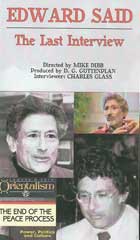
Edward Said: The Last Interview 2004
Distributed by First Run/Icarus Films, 32 Court St., 21st Floor, Brooklyn, NY 11201; 800-876-1710
Produced by D.G. Guttenplan
Directed by Mike Dibb
VHS, color, 114 min.
College - Adult
Literature, Middle Eastern Studies, Postcolonialism
Date Entered: 04/29/2005
Reviewed by Rebecca Adler, College of Staten Island, City University of New YorkIt would be difficult – no, impossible – any time soon to be able to respond dispassionately to Edward Said the man, Edward Said the work. Brilliant innovative critic and scholar, courageous truth teller, champion of a dispossessed people to the idolizing many on the one side; angry self-promoting hypocritical dissimulator, inflammatory political activist to the contemptuous many on the other – Said compelled you by his outspokenness to take an extreme position for or against.
Said’s career embraced two domains: one, disinterested literary scholarship – his book Orientalism virtually started an academic field – and two, passionate partisan advocacy of the Palestinian cause. For a long time he was a member of the Palestinian National Council, from which he resigned in 1991. He charged that Chairman Arafat’s tactics and corruption were compromising the fight for a national state. He was a vociferous critic of the Oslo accords and of the peace process, claiming its terms constituted a sellout to the Israeli side. As early as 1991, he was diagnosed with incurable leukemia, the disease becoming increasingly disabling with the years. At a certain point, Said ceased writing and giving interviews. He agreed exceptionally to the present one, which was produced by a former student and conducted over three days in September 2002. He died less than a year later, on September 25, 2003.
The interview we see (close to two hours, an essentially fixed camera) can only elicit admiration and respect for Said the person. Prompted by sympathetic questions from interviewer Charles Glass (a British journalist, himself a strong supporter of the Palestinian cause), Said admits that the disease has sapped his physical and intellectual energy, and he has reluctantly accepted that it will sooner or later prematurely end his life. Reality finds him exhausted, angry, confounded – and brave. (Courageous acknowledgement or not, it’s sadly evident – tired and ravaged as he is – that he is waging a losing battle….) Still, there is so much passion in him once he gets going. Said is a charming, articulate, brilliantly persuasive speaker. He talks about his life in the Middle East (he was born in Jerusalem, brought up in Cairo, with a lot of time spent in Lebanon), about his academic career, his love of music, his disagreements with Arafat, his view of the Palestinian/Israeli conflict. He confesses he can’t quite explain how the Palestinians, perhaps the most educated of all the Arab populations, continue to pick poor leaders, and he blames the intellectuals among them for their complacency. His outrage is selective. He is most emotional describing an Israeli bulldozer rooting out trees near a Palestinian village, while suicide bombings are mentioned in passing, no comment necessary except to say they are ineffectual. His proposed solution to the Palestinian/Israeli standoff is not original with him. He envisages a single bi-national state, one citizen, one vote. He doesn’t believe the identity of the Jewish State would be threatened thereby, ignoring that Israelis might see in the proposal the ultimate existential danger. Glass in any event labels the proposal Utopian, and Said replies that given the alternative – endless violence and destruction – the Utopian solution may be the most realistic one….
Looked at from whatever perspective, the film is an invaluable document, portraying as it does an influential literary and political figure restating his pro vita summa near what turned out to be the end of his life. If you come to the film with an informed predisposition, you won't find your view of things changed by it. Without a predisposition, and with no corrective from the other side, the dying Said will most likely win you over to his.